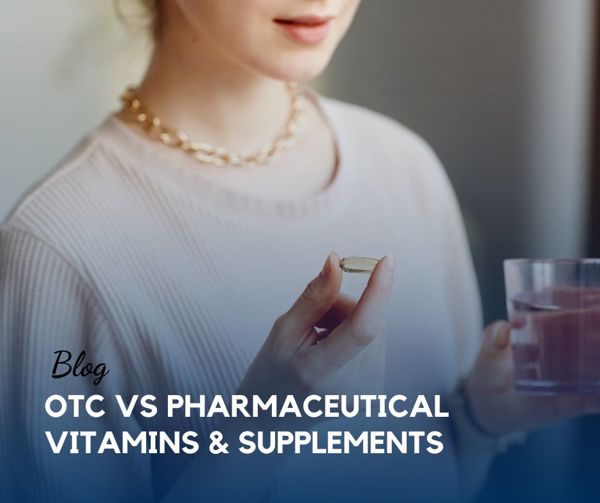
OTC VS Pharmaceutical Vitamins & Supplements
When comparing pharmaceutical-grade vitamins and over-the-counter (OTC) vitamins and supplements, it's important to consider the pros and cons of each. Here are some key points to help you understand the differences:

Pharmaceutical-Grade Vitamins:
Pros:
- Higher Quality: Pharmaceutical-grade vitamins undergo rigorous testing and quality control measures to ensure purity, potency, and consistency.
- Enhanced Bioavailability: These vitamins are formulated using high-quality ingredients and optimal concentrations to maximize absorption and effectiveness.
- Precise Ingredient Labeling: Pharmaceutical-grade supplements provide accurate and detailed ingredient information, allowing consumers to make informed choices.
- Trusted Recommendations: Healthcare professionals often recommend pharmaceutical-grade vitamins for specific health conditions or deficiencies.
- Reliable Results: Due to their higher quality and bioavailability, pharmaceutical-grade vitamins may provide more reliable and consistent health benefits.
Cons:
- Higher Cost: Pharmaceutical-grade vitamins tend to be more expensive than OTC alternatives due to their superior quality and manufacturing processes.
- Limited Accessibility: These vitamins may not be as widely available as OTC options and might require a prescription or specific distribution channels.
Over-the-Counter (OTC) Vitamins and Supplements:
Pros:
- Accessibility: OTC vitamins and supplements are widely available in pharmacies, grocery stores, and online, making them easily accessible to consumers.
- Affordability: OTC options are generally more affordable compared to pharmaceutical-grade vitamins, making them more budget-friendly for many individuals.
- General Health Maintenance: OTC vitamins can be suitable for individuals seeking basic nutritional support for overall health and well-being.
Cons:
- Lower Quality Control: OTC vitamins may not undergo the same level of regulatory scrutiny and testing as pharmaceutical-grade supplements, which could result in variations in quality, potency, and purity.
- Less Bioavailability: Some OTC vitamins use synthetic or lower-quality forms of nutrients, which may have lower bioavailability, making them less effective in delivering desired health benefits.
- Incomplete Ingredient Information: OTC supplements may not always provide detailed ingredient information, making it challenging to evaluate their quality and potential interactions.
- Limited Tailored Recommendations: OTC vitamins are not specifically designed to address individual health conditions or deficiencies, and their formulation may not be optimized for specific needs.
Ultimately, the choice between pharmaceutical-grade and OTC vitamins depends on individual preferences, health goals, and guidance from healthcare professionals. For specific health concerns or targeted nutritional support, pharmaceutical-grade vitamins may offer a more reliable and effective option, while OTC vitamins can be suitable for general health maintenance and basic nutrient supplementation.
Bond Medical Center will you weigh your needs and options for all of your supplmental needs.
Medical Website Designed & Developed by
The information contained on this website is for information and education purposes only and should not be a substitute for medical advice. Consult with a physician for your specific medical needs.

